BHP
0 opportunities
Australia
More than 10,000 employees
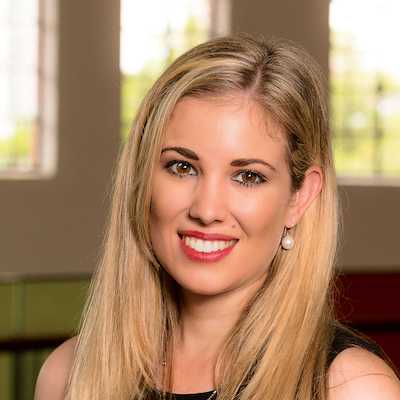
Kathryn Young
Superintendent - Geotechnical
Bachelor of Engineering (Hons), Majoring in Civil Engineering
What's your job about?
I work for BHP in their coal assets as a Geotechnical Superintendent. I manage a team of Geotechnical Engineers across 5 sites. I work an 8 days on 6 days off roster, FIFO from Brisbane to the Bowen Basin. Working with teams across multiple sites means I move around a lot and try to spend 1-2 days at each site per roster. A requirement of the role is to be a RPEQ (Registered Professional Engineer of Queensland) as we supervise the work of other engineers.
The superintendent role focuses on reviewing the hazard management and design documents that the site engineers complete. I also oversee the risk management, get involved with our high consequence designs and hazard management, work on improvement projects and initiatives that impact all sites and help to ensure best practice is consistent across sites. We also want to make sure we're training, developing and upskilling our team.
A typical day for me can be very dynamic as we have to adjust and prioritise based on what the needs are for the operations. I could be reviewing hazard reports or monitoring plans, consulting with a site geotechnical engineer on their design/hazard controls, reviewing a Geotechnical Pit Layout (mine design) for a particular site. Or I could be working on improving group level documents, getting involved with audits or creating information briefs to share learnings across the coal business.
What's your background?
I was born and grew up in Brisbane. I didn't really consider an engineering degree until my last semester of high school where I kind of landed on it because I really enjoyed science and maths and thought it would be a good practical application. Due to this, I hadn't really considered a major until I was at university - I considered Biomedical before landing on Civil Engineering because I wanted to design the next Millau Viaduct or Burj Kahlifa - very different from what I am doing now! I got my first exposure to mining during an internship and although I worked in the civil industry for one year after university, I returned to mining the following year in the BHP Graduate Program.
I have spent the past 9 years with BHP working across a number of their coal assets as the site Geotechnical Engineer and for the past 12 months as one of the Geotechnical Superintendents. I've had many career highlights but a call out would definitely be being recognised as an Exceptional Young Women in Mining and Resources at a state (QLD) and national level. I've also co-authored papers and presented at conferences and been involved in geotechnical societies.
I currently work FIFO from Brisbane to the Bowen Basin. My husband also works in resources and we have one child with another one on the way this year.
Could someone with a different background do your job?
I have pursed this job through a civil engineering degree with a focus on geotechnical engineering, however, I've also seen Mining Engineers and Geologists take on the role. I think the most important thing is to have a keen interest in geology and rock mechanics and how these influence mine design. You also need to have a great appreciation for safety in design, risk management, a problem solving attitude and great communication skills. There's no point having a good idea if you can't communicate it to the wide variety of people you work with.
What's the coolest thing about your job?
The coolest thing about my job is getting to work with many stakeholders and across such a span of the mine lifecycle. We are involved in exploration planning, long and short term mine planning, operations, hazard management and mine closure. Additionally, we have a great mix of in the field "hands-on" work on site as well as getting to put our engineering skills to work in the office and doing designs and assessments.
What are the limitations of your job?
Being a Geotechnical Engineer comes with a lot of responsibility. You are heavily involved with managing a principal hazard (a hazard which could cause fatalities). You have to have great attention to detail and be thorough to ensure that we are managing the risk at an acceptable level and keeping people safe.
A lot of the work we do also requires in field inspections and monitoring - therefore, whilst there are some projects and design work that can be done remotely, the role in your formative years will likely be site based. The site engineers often work roster to ensure we have adequate operational coverage.
3 pieces of advice for yourself when you were a student...
Be open minded to new opportunities - I really thought I wanted an office job and would pursue that after doing some site time but here I am 9 years later still doing FIFO and enjoying it.
Volunteer and get involved - I have met many new people across the business and within the geotechnical industry by volunteering on committees and attending industry events. It helps build up your professional network.
Don't be discouraged by knock backs - these will happen. Remain focus on what you want to achieve and build your competencies.
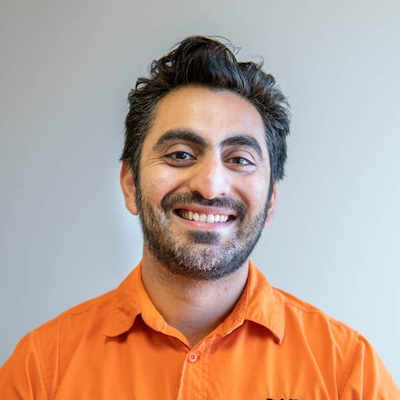
Ali Honarmand
Superintendant - Production Scheduling
Bachelor of Mining Engineering and Bachelor of Commerce (Finance)
What's your job about?
I work as a Mine Planning and Scheduling Superintendent at BHP, one of the largest mining and resources companies in the world. BHP extract the resources needed to support the development of future infrastructure.
I manage a team of 14 Engineers who design and plan mining related activities from 1-week to 2-years, including the creation of the mine site budget of the South Flank iron ore mine. This involves meeting the required tonnes of iron ore for stable production, ensuring it gets to the rail and port in a safe and socially responsible way.
We collaborate and engage with a large number of groups and departments across BHP to communicate the plans and designs. Our team works hard to identify risk early and in collaboration with other departments, provide solutions to manage the risk. In simple terms, we enable safety and value through the plans and designs we make and solve problems every day in a dynamic and fast paced environment.
As a Leader, it's important that my team not only have all the tools and resources needed to complete their work but that provide them with clear expectations. I ensure their long-term development plans and aspirations are prioritised and we regular conversations to ensure they are high-performing, engaged, happy, enabled and on the right path to meet their long-term career or life goals. And of course, the most important part, ensure they are physically and mentally safe at work.
What's your background?
I was born in Shiraz/Iran, where I grew up until age 13 and my family migrated to Australia, Perth. Growing up I had fantasies of wanting to become a pilot, historian, lawyer and never really considered Engineer as an option until the later years of high school. In Year 12 I was fortunate enough to visit the Pilbara on a school trip and visited BHP's port operations. This was my first exposure to mining and was amazed by the scale and complexity of everything. From this point, I decided to study engineering.
There are many stages in life that are important and with each day, as we face change, opportunities, and challenges of life and work. Few key moments in my professional life would have to be my first vacation work in 2010 when I decided mining engineering was the path I wanted to follow, my first internship with BHP in 2011 and continuing to work part-time for BHP for 3 years while I studied, then in 2018 when I joined the BHP Graduate Program and realised the true meaning of a career - it's a marathon! Be sure to prioritise life/health and work balance and invest in personal growth.
Throughout my years in various roles in BHP I realised that leadership is a career path, where I can help others reach their objectives, coach, mentor and enable teams and be an agent of change. This is how I reached my current role as a Superintendent of Production Scheduling.
Could someone with a different background do your job?
Yes. Having the technical and expertise of a mining engineer is great, but it is not always necessary. The attributes one requires to do my role are:
- To solve problems; remaining objective and level minded
- To set targets and metrics to ensure high performance, whether it is individuals or the business
- To communicate with impact and see more than one point of view
- Being flexible to change, versatile and open to other ideas and approaches
- Being able to identify risk and understand how a risk can manifest without necessarily having the time to analyse all aspects of it
- Having the ability to see and understand gaps in systems, routines, and processes and able to put a plan in place to close the gaps
- Being able to prioritise, time manage with a dash of patience and resilience, and most of all, have fun and keep a light sense of humour!
What's the coolest thing about your job?
There are many things I love about my role, but to call out a few:
Seeing my team enabled, working well together and with our stakeholders. There is a lot of Joy I get, when I see the people in my team achieve great results and get recognition from outside of the team. Whether it is their own hubris, or whether it is through my guidance, it makes me very happy.
I love the work environment of the mine , being able to come together with the teams I work with to solve problems and find opportunities, and of course seeing the problem solved or the opportunity realised.
I get a lot of satisfaction from sharing my knowledge and passion with those around me and seeing them put that to use. Also through that coaching and teaching or sharing of knowledge, that I learn something new and grow.
What are the limitations of your job?
My role bears a lot of responsibility and has a wide span of control. Whilst this is exciting, it can also be stressful. So it's important for me to understand the sources of the stress and manage it, to ensure that I am not burned out and I can maintain my energy level. I spend a large amount of time in meetings engaging with various stakeholders, and therefore time management and delegation become key in ensuring my work is not falling behind, that and trusting and enabling my team to work through the wide span of control.
3 pieces of advice for yourself when you were a student...
Get involved in university clubs, industry nights, do exchange, take a gap year/semester and travel, enjoy life and live in the moment, but don't lose sight of longer-term goals, plans and the bigger picture in life.
Invest time in becoming more self-aware, practice mindfulness, improve communication skills and maintain hobbies and curiosity. Pursue an attitude to improve your surroundings, help others and realise change is the only constant in life.
Get internship early, apply to everything and pursuit work experience early in your degree.
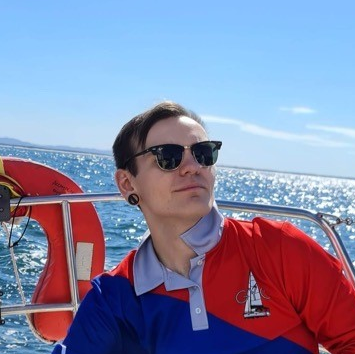
Dylan Williamson
Project Manager
Bachelor of Engineering (Mechatronic)
What's your job about?
BHP owns and operates seven coal mines and one port in Queensland. My team, based in Brisbane, is responsible for delivering projects across these operations. Each project is worth up to twenty million dollars (this is just my team - in other parts of our business, BHP also has projects worth well over a billion dollars) and involves some engineering complexity.
A typical project involves buying a new piece of equipment, getting engineers to design all the bits that connect to it, and then all the work to install it and get it going.
Most of the time I work from my home office or the corporate office in Brisbane city, but today I'm with a consultant on site at one of our open cut coal mines. We've been staying at a mining camp and were up early for breakfast in the mess hall. Today we spent the morning walking around our coal processing plant to learn about the condition of the existing equipment and the challenges faced by the Maintenance and Operations teams. This afternoon is all about planning the project and answering the questions: How much will it cost to do this upgrade? When can we have it done by? What are the benefits of doing it?
What's your background?
I grew up on the Sunshine Coast and spent most of my time reading books and going to see metal bands. I moved to Brisbane to go to university and study Mechatronic Engineering at the University of Queensland. I rented rooms in share houses with my partner for the first couple of years, and then cheap apartments in Fortitude Valley for the last few. I mostly delivered pizzas up until fourth year where I found some work at a local digital marketing company developing apps. After I graduated, I worked with CSIRO's robotics research group for a year before moving to BHP as a graduate in 2017.
As a first year Graduate I was relocated to Moranbah and put in the site project delivery team. I'd never been to a mine site before and never managed a project, but the best way to learn something is to fail it at it until you learn. I learned a lot that year!
As a second year Graduate I got myself rotated to our global Technology team based in Brisbane, where I worked on projects that were more "Mechatronics". At the end of my graduate years I was offered a role in the central Brisbane project delivery team where, taking on bigger and bigger projects.
I still read books and go to see a lot of metal bands.
Could someone with a different background do your job?
Yes. Project managers don't have to be technically excellent, and it's normal to manage projects outside of your technical discipline. There is someone in our team with a HR degree managing engineering projects! What's most important is to know enough to learn what you need to learn, and be okay with letting other people know the rest. By far the most important skills for a good project manager are soft skills: they're the same skills that make great managers and great leaders.
What's the coolest thing about your job?
Scale. Mines are big. The equipment is big. Projects change something about our operations, which means our changes are also big, and the projects get big. There aren't many jobs where you work with equipment the size of an apartment building and, except in senior management, measure your budget in the millions of dollars. The coolest thing about my job is seeing how my work changes something about the way the business mines and processes a critical commodity.
What are the limitations of your job?
Project management is best suited to confident people who thrive on change and responsibility.
Time scales are often years long, which means you need to make decisions and be comfortable with the consequences for months to come.
Project are very different through the life cycle: the problem solving phase, to the engineering phase, to the construction phase, feel very different to work in.
You are 100% accountable for anything that goes wrong, and something always goes wrong.
3 pieces of advice for yourself when you were a student...
Get involved in student societies. Industry societies are best, discipline societies next.
Go to more student social events. Try harder to make friends and keep in touch.
You don't need to buy the textbook, but it's worth occasionally going to the library and cracking it open.
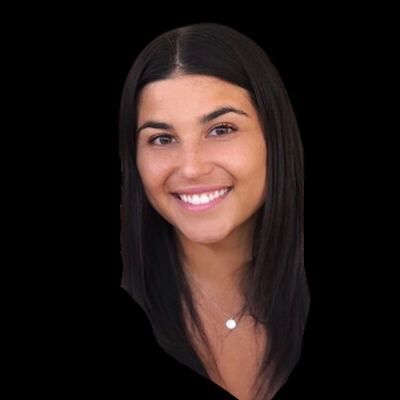
Rachel Fong
Integration Lead
Bachelor of Commerce (Corporate Finance/Marketing)
What's your job about?
The WA Asset Projects team at BHP study and deliver investments >$20M to support our Iron Ore and Nickel assets achieve their social value, safety, production and culture plans.
The best thing about my current role is that no day is the same. One day I could be developing our department's Social Value Plan, looking at ways we could better embed environment and community impacts in the way we make decisions and then another, I could be coordinating our budget planning process ensuring that we can deliver to our customers' needs in a cost and schedule efficient way.
My job is always changing, sometimes in the most unpredictable way but that's what I thrive on! It gives me the autonomy and 'a seat at the table' to drive solutions to our tactical and strategic problems across all areas of how we work, so we can get better every day. Some of the more recent and interesting work I have been able to do is:
Run our strategic planning process - having a holistic view of how our +AUD$10B portfolio contributes to BHP's iron ore and nickel assets goals and working with people across the Business to optimise how we deliver this.
Significantly uplift our department's (+250 people!) - understanding and appreciation of Indigenous culture and history to contribute to creating an inclusive workplace for my fellow Indigenous employees.
What's your background?
I grew up with my extended family on Yawuru Country in Rubibi, or as many would know it as Broome, Western Australia. Growing up in a place that is best described as a multicultural melting pot instilled the importance of diversity and inclusion in me from the get-go. I think that experience and viewpoint shaped the very core of who I am - it's important that we embrace our differences, everyone deserves the opportunity to be part of something great!
I was privileged to go to boarding school in Perth. Living in the 'big city' gave me the confidence to apply and attend university, where I chose to study commerce because it has no limits and offers enormous versatility.
I applied for the BHP Graduate Program initially in Finance but was offered a role in Human Resources. Accepting this role taught me to be comfortable with the uncomfortable and embrace an opportunity even if it wasn't something I initially planned for. Being onsite and in HR accelerated my personal and professional growth. 21 and providing advice to senior operational management on how they should run their teams was undeniably surreal and invaluable to how I approach everything at work.
I transitioned to the Finance team after rolling off the Graduate Program and I found myself once again vulnerable but ready to learn a completely different skill set.
I left BHP for a few years to work for an Australian start-up consulting firm based in the United States, optimising international clients' supply chains. After that I took a career break in Amsterdam for a year before heading back to Australia and re-joining BHP!
In the past five years I have worked in two different departments and in four different types of roles. There are very few companies that can offer and support the type of career diversity I have been so lucky to have.
Could someone with a different background do your job?
Of course. I am a strong believer that by embracing our differences we can only be stronger. If someone has a strong work ethic, is willing to learn, can embrace and see opportunities in change and work as part of a team - I think they can do anything! For my role specifically, having strong communication skills is also important and being able to meaningfully visualise, persuasively verbalise and succinctly write goes a long way.
What's the coolest thing about your job?
The 'coolest' thing about my job is what I am a part of - we directly maintain and improve our iron ore and nickel businesses in a tangible way, is so enormously unique.
The BEST part of my job is that I get to act as a sounding board for (really) experienced people and offer my thoughts on their ideas, plans, and dreams, whilst also contributing my own. I love seeing the team challenge their usual way of thinking and having conversations they may have not had before.
What are the limitations of your job?
Every job has benefits and limitations. I sit on our department's leadership team, directly supporting our Head of Department, so there's an inherent responsibility to ensure that I am across a lot of information and ensure I provide the right advice and consider the right things in the situation.
With that responsibility and the hugely dynamic environment, it can mean that I work late or work on weekends. I manage that by keeping balance front of mind, accepting that my work is cyclical and I need to work the highs but ensure I ride the lows as well. BHP is extremely flexible when it comes to the way we work and being honest and upfront with your manager is so important to find an arrangement that works best for you and your role.
3 pieces of advice for yourself when you were a student...
If you are going to get wet, you might as well go swimming. Give everything your all no matter what!
Worrying is like a rocking chair, it gives you something to do but doesn't get you anywhere. Embrace that uncomfortable feeling and be vulnerable, it's important to have a level of chronic unease but go easy on yourself.
Remember that someone's success doesn't take away from your own. We are only stronger together, take the time to learn about who is in your life and learn from them.
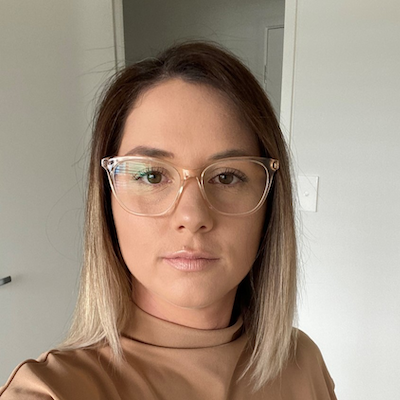
Sharna Armstrong
Capability Specialist
Bachelor (Hons) Chemical and Environmental Engineering
What's your job about?
I am currently working in a secondment for the Resource Centre of Excellence (RCoE) to attract, build and retain the pipeline of technical talent in the geoscience and resource engineering fields. My most recent project has been the project management of the Minerals Australia Resourcing Your Future (RYF) first year intern program. RYF exposed 60 first year university students to the resources industry to showcase the range of careers that are open to them if they choose to select resources-related tertiary education.
My usual role is a Process Engineer at our Brisbane Integrated Remote Operations Centre (IROC) where I work with Control Specialists, Controllers and site Processing Operations teams to optimise the safety, efficiency and quality of our Coal Handling Preparation Plants (CHPP).
What's your background?
I am a Brisbane born-and-bred girl who didn't leave the area where I grew up until I did my internship with BHP in Dysart, QLD. When BHP called to say I was heading to Dysart, I had to look on a map to know if it was even in Australia! Since then, my fiancé and I have lived in Blackwater while I was a graduate (which we absolutely loved and still miss to this day!), moved back to Brisbane while I did fly-in-fly-out (FIFO) at Saraji Mine and had two crazy daughters who are now 1 and 2 years old. I secured the Brisbane IROC role after returning to work with my first daughter and the RCoE secondment after my second where I have now worked for 8 months.
I scored my current secondment as I am extremely passionate about STEM in our future workforce and regularly volunteered at school and university events. It was also a completely different role to anything I have done in my engineering career so was a great opportunity to learn some new skills. A very smart person once told me that if you can do something you do for fun and get paid for it, you've found the secret recipe.
Could someone with a different background do your job?
Absolutely! Not only can someone with a different background do my job, but it is necessary for people of different backgrounds to be in the team for us to excel. My IROC Process Engineering team is a diverse bunch in terms of culture, thought, gender and working style and it the best team I have ever worked in. While it is necessary to have a foundational knowledge of Process or Chemical Engineering to do my IROC role, most of the day-to-day skills I have used in all my roles are soft skills of organisation, communication, management, and collaboration.
What's the coolest thing about your job?
I'm an engineer so I love data and graphs. In my job, I get to use that data to identify inefficiencies, propose and plan improvement initiatives with other engineers, scientists, operators and trades, project manage and execute the initiatives and then physically watch them unfold on a CHPP. I see and manage the whole project from start to finish, all while balancing my family and personal life. For the most part, I have the flexibility to work my hours whenever I want if I am meeting my deadlines.
What are the limitations of your job?
My role as a Capability Specialist is a Minerals Australia role meaning that my teams are dispersed across the country and sometimes even internationally. I thrive off collaboration, so I sometimes struggle to form that personal, team bond when I am working via video calls. Similarly, as a Process Engineer, it's tricky executing projects on sites in Central QLD when I am based in Brisbane. If I could step foot outside of my home onto a mine site I definitely would.
3 pieces of advice for yourself when you were a student...
- Fill your bucket. Take care of your mind, health, your family and friends. Go on holidays. Do a sport. Find a hobby. These things will actually help you in job interviews and your working life.
- Group assignments may seem like a pain, but they are so important as you are learning skills that you will use forever in your career. I'll argue that these are the most important skills. Use a personality assessment tool to understand how each other work.
- Network with industry. Attend as many industry events as you can manage.
